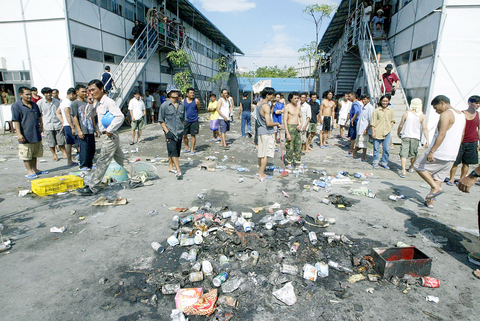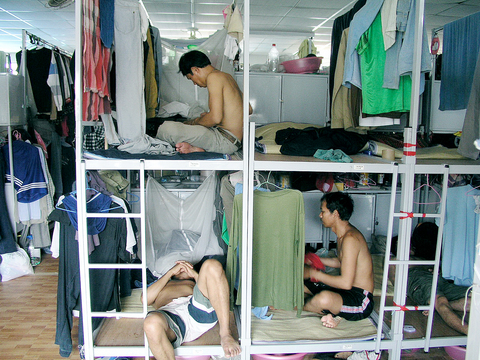Furious with what they saw as inhuman personnel management, some 300 Thai workers in Kaohsiung set fire at the management center, a work dormitory, cars and other facilities Sunday night, police said.
Television stations aired footage of the workers clashing with police, attacking them with rocks and bottles in the overnight riot.
Several officers were injured by rocks shot with slings by the Thai workers, while one Thai worker was injured by broken glass in the dormitory, police said.

PHOTO: REUTERS
The riot began about 9:30pm Sunday at the five-story dormitory housing 1,700 Thai workers, who are building the Kaohsiung mass-transit system. The management company was hired by the Kaohsiung Mass Transit Bureau to manage the workers' living conditions.
"Some Thai workers clashed with management personnel, who tried to discipline the drunken workers who were shouting in the dorm. The management personnel stopped one Thai worker from using a cellphone and reportedly hit him with an electric prod," the Broadcasting Corporation of China (BCC) reported.
"The two incidents prompted the Thai workers to vent their pent-up anger at the management, so they rioted," it reported.

PHOTO: WANG RONG-HSIANG, TAIPEI TIMES
In addition to the bans on alcohol, cellphones and Thai television in the dormitory, the Thai workers were required to use tokens in the dorm store, but they allege they were short-changed when exchanging the script for real money, it added.
Of the 1,700 Thai workers in the five-story dorm, some 300 took part in the riot, setting fire to management offices and cars, burning clothes and hurling rocks at police who responded to the fire report.
Police, members of Thailand's representative office in Taipei, the construction company and the recruiting firms' representatives were involved in negotiations with the Thai workers to end the standoff.
Authorities yesterday agreed to the demands made by several hundred Thai workers, ending the confrontation.
But officials also decided to charge the rioters and deport them for starting the riot, which cost the employer at least NT$10 million (US$322,500) in damages.
"After three rounds of talks, the Thai workers have agreed to end their protest and return to work after the management company accepted most of their demands," said Fang Lai-chin (
The workers demanded that they be allowed to use cellphones, that food quality at the cafeterias be improved and that a satellite dish be installed so they can watch TV programs from their home country.
They also protested the management company's unreasonable methods of payment -- for each 100 hours of overtime, they are only paid for 46 hours.
The workers also complained that they could not take back food and daily necessities that were not purchased at the dormitory store.
The Huapan Co last afternoon agreed to most of the workers' demands.
Fang said the labor authorities will investigate the management methods of the company and will ask that the company dismiss supervisors treating the workers in inhuman ways.
Meanwhile, officials threatened the workers who took a stand against the company with deportation. Lai Chin-lin (賴勁麟), vice chairman of Cabinet's Council of Labor Affairs, said workers found guilty of starting the riot will be deported for violating law and order.
He said the council will also punish the employer, the Kaohsiung Mass Transit Bureau, for mismanagement by slashing by 800 the number of foreign workers the company is entitled to import to help it construct the transit system.
Asked for comments, Premier Frank Hsieh (
"These people [foreign workers] flew far away from their homes and came to Taiwan for jobs, and most of them are doing heavy-duty work, such as construction work. Basically, we should try to understand their feelings," the premier said.
"Employers should pay attention to these foreign workers' emotions from time to time, because it will be too late to do so when tragedy happens," he said, adding that he has already directed the Council of Labor Affairs (CLA) to look into the latest incident.
There are some 100,000 Thai workers in Taiwan.
Additional reporting by Jimmy Chuang

The CIA has a message for Chinese government officials worried about their place in Chinese President Xi Jinping’s (習近平) government: Come work with us. The agency released two Mandarin-language videos on social media on Thursday inviting disgruntled officials to contact the CIA. The recruitment videos posted on YouTube and X racked up more than 5 million views combined in their first day. The outreach comes as CIA Director John Ratcliffe has vowed to boost the agency’s use of intelligence from human sources and its focus on China, which has recently targeted US officials with its own espionage operations. The videos are “aimed at

STEADFAST FRIEND: The bills encourage increased Taiwan-US engagement and address China’s distortion of UN Resolution 2758 to isolate Taiwan internationally The Presidential Office yesterday thanked the US House of Representatives for unanimously passing two Taiwan-related bills highlighting its solid support for Taiwan’s democracy and global participation, and for deepening bilateral relations. One of the bills, the Taiwan Assurance Implementation Act, requires the US Department of State to periodically review its guidelines for engagement with Taiwan, and report to the US Congress on the guidelines and plans to lift self-imposed limitations on US-Taiwan engagement. The other bill is the Taiwan International Solidarity Act, which clarifies that UN Resolution 2758 does not address the issue of the representation of Taiwan or its people in

US Indo-Pacific Commander Admiral Samuel Paparo on Friday expressed concern over the rate at which China is diversifying its military exercises, the Financial Times (FT) reported on Saturday. “The rates of change on the depth and breadth of their exercises is the one non-linear effect that I’ve seen in the last year that wakes me up at night or keeps me up at night,” Paparo was quoted by FT as saying while attending the annual Sedona Forum at the McCain Institute in Arizona. Paparo also expressed concern over the speed with which China was expanding its military. While the US

SHIFT: Taiwan’s better-than-expected first-quarter GDP and signs of weakness in the US have driven global capital back to emerging markets, the central bank head said The central bank yesterday blamed market speculation for the steep rise in the local currency, and urged exporters and financial institutions to stay calm and stop panic sell-offs to avoid hurting their own profitability. The nation’s top monetary policymaker said that it would step in, if necessary, to maintain order and stability in the foreign exchange market. The remarks came as the NT dollar yesterday closed up NT$0.919 to NT$30.145 against the US dollar in Taipei trading, after rising as high as NT$29.59 in intraday trading. The local currency has surged 5.85 percent against the greenback over the past two sessions, central